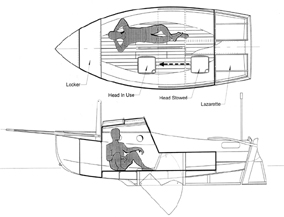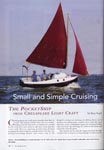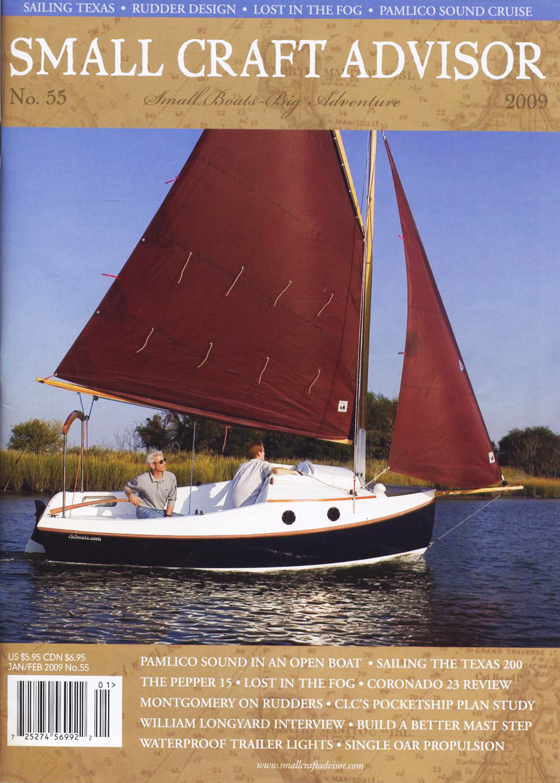"PocketShip" is a small cruising sailboat of refined model, meant to sail well on all points, provide dry camping accommodations for two adults, and tow behind a four-cylinder car. More than 60 are sailing or under construction on six continents.
Designer John C. Harris has designed, built, owned, and cruised aboard a variety of smallcraft. His first camp-cruiser as a teenager was an 11'6" rowing boat with a tent, in which he explored the upper Chesapeake, sleeping aboard. Twenty years later, he wanted a fast-sailing pocket cruiser with a dry and commodious interior. It had to be quick and easy to build or the project would never get finished, so stitch-and-glue plywood construction was a given from the start. The cockpit was laid out for daysailing comfort and is large enough for sleeping on warm nights.

Interior arrangements are ample, we think bigger and more comfortable than anything else this size, without compromising Pocketship's looks and performance. Two adults may sleep below or wait out a rain shower, and a portable head stows beneath the cockpit, sliding forward into the cuddy for use. The enclosed area of the cabin is identical to an average four-man tent, but drier, more private, and more secure.
Geoff Kerr of Two Daughters Boatworks built the first hull. He started in mid-January 2008 and clocked about 525 hours before delivering a finished hull and spars, ready for hardware. PocketShip was rigged at CLC and launched on May 10th, 2008. The typical amateur builder might require about 30 weekends and occasional evenings to see this one through.

PocketShip's big interior.
See more interior photos in the main gallery.
Plans comprise 11 pages of architectural drawings, plus full-sized patterns for nearly every part in the boat. Plans and manual are in both metric and standard measurements. The manual is 280 pages, spiral-bound, and lavished with nearly 800 images and drawings showing construction step-by-step. No other manual like it exists for a build-it-yourself pocket cruiser design. We recommend purchasing the manual in advance of the kit; in addition to walking you through construction, the manual will answer questions about tools, materials, and your building space needs.
The PocketShip kit comprises a number of separate packages. Some builders buy only one or two of the packages, using the guidance in the instruction manual to shop locally. A few builders buy all of them. Obviously you can pick up the packages at intervals during construction---you need only the base kit or plans to get started. The available packages include Solid Timber, Hull Hardware, Sailing Hardware, and Running Rigging.
You can watch Part 1 of a video about the design concept and hull construction by scrolling down. Part 2 shows completion and sailing footage. The 2014 video here covers launching, rigging, and sailing.
 |
 |
PocketShip is stiff and fast and tacks through 90 degrees. The helm is light and the boat will spin nearly in its own length in both light and heavy air and with a variety of sail combinations. We are thrilled with performance and handling---all expectations have been exceeded. The boat's speed under sail startles larger and more pretentious boats.
Click on the “Construction Gallery” to see a step-by-step commentary by John Harris about the design and construction of PocketShip. You'll need to enlarge the pop-up Gallery window or scroll down to read the captions that accompany each image. Click the "Main Gallery" link to see photos of PocketShip under sail in a variety of wind and sea conditions.
Many ask about auxiliary power for PocketShip. While the boat's sailing qualities are sufficient to undertake long expeditions in challenging waters without power, many sailing examples have small outboards mounted on a stern bracket for negotiating marinas, channels, or flat calms. We've seen up to five horsepower, but two horsepower is ample even for rough conditions. The excellent Honda four-stroke 2hp is light enough not to diminish sailing qualities. Aftermarket outboard brackets are plug-and-play without modification to the transom. John Harris built this simple outboard bracket for PocketShip #1 and it has worked admirably.
"Go simple, and if that appeals to you then there is no more simple way to cruise than this design from John C. Harris. ...This is one dandy looking little boat. It’s shapely, with lots of sheer, a pugnacious bow profile and sweet overall hull lines." Robert H. Perry, Sailing Magazine June 2009
Builders are sharing photos and experiences at the official PocketShip bulletin board, PocketShip.net
|
As seen in WoodenBoat #207
|

|
As seen in WB's SmallBoats 2021 Edtion
|
|
|
|
